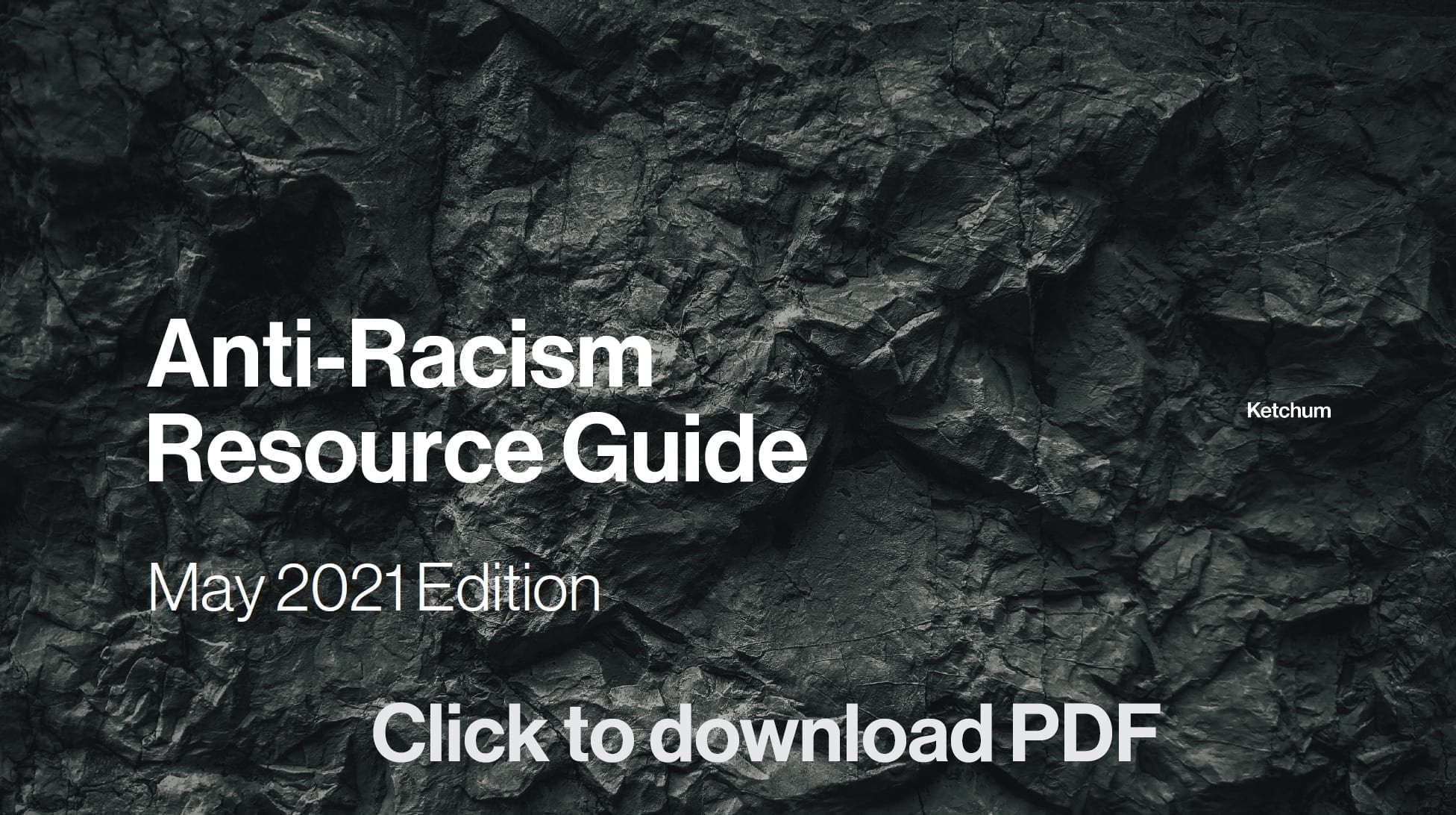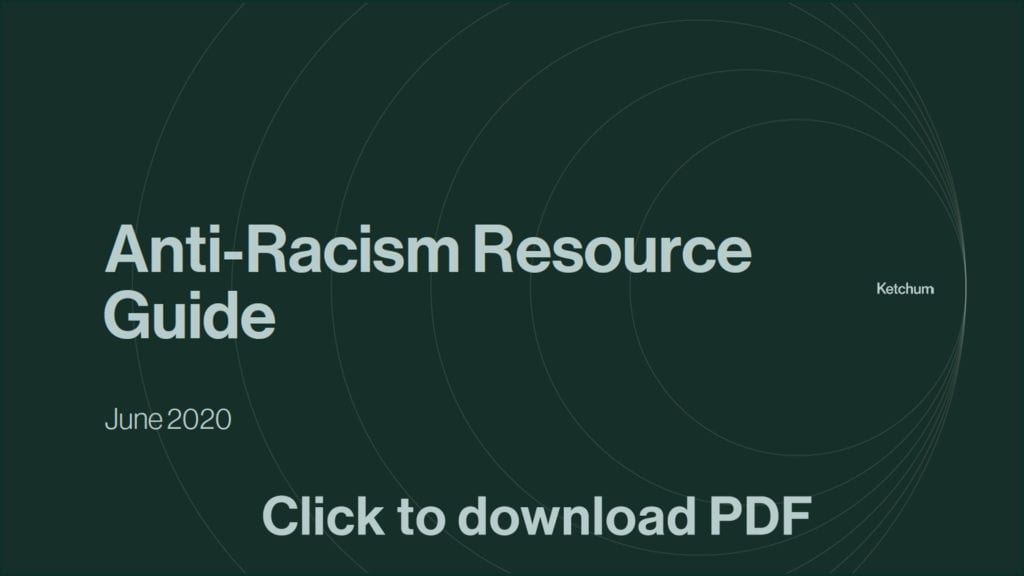Ketchum’s culture is built on a shared sense of belonging, where every one of us feels heard, respected and included. A Force for Good is one of our core values, and we strive to be a force for positive change. Recent events remind us that as racism and intolerance continue to plague our world, it is incumbent upon all of us to condemn acts of hatred and violence toward marginalized communities.
We believe the first step lies in educating ourselves. We are encouraging our teams at Ketchum to reference this guide (along with an updated edition from May 2021, focusing on stopping Asian hate), which compiles a sampling of resources to give colleagues a variety of options to help them delve deeper into the topics of social justice and anti-racism. This list comes from a range of insightful materials we’ve seen online –including this fantastic Antiracism Resources Google Doc compiled by Sarah Sophie Flicker and Alyssa Klein—as well as recommendations from our team internally. By no means is this list exhaustive, and we understand that this journey is personal and will vary for each of us.
We are encouraging our colleagues to start by picking 3-5 options from this guide, and we invite our friends of Ketchum to do the same. Whether you prefer to Read (books, articles), Listen (podcasts), Watch (television, film), Follow (social media accounts), or Act (learning courses, other ways to engage), we hope you find something in this guide that inspires you.
Be an Effective Listener/Reader/Viewer/Learner
Understanding that this learning journey is personal, we thought it might be helpful to share some tips about how we approach learning at Ketchum.
-
- Set an intention to listen/read/observe with a specific purpose in mind. If possible, write your intention down. It can be as broad or as narrow as makes sense for you in the moment.
- While you’re listening/reading/observing, pay attention to your reactions. Note where you feel agreement. Note when you feel challenged.
- Adopt a frame of curiosity. Allow yourself to “wonder” what might be triggering some reactions, or wonder how you might challenge some of your assumptions.
- As questions emerge, seek out new resources from sources you trust. Ask others who/what they’re learning from now. If you’re comfortable to do so, share your learning intent with them.
- Take notes, and plan to review your notes for a few minutes each day. Jot down any new observations, insights, “wonderings,” etc. as you go. New connections sometimes take time to unfold.
Remember: your brain is designed to learn and grow and adapt and change.
Read (for Adults)
Article: The Atlantic—Who Gets to be Afraid in America
By Ibram X. Kendi, Director of Antiracist Research and Policy Center at American University
Unpacks this sentiment from the author: Americans don’t see me, or Ahmaud Arbery, running down the road –they see their fear.
Book: How to Be an Antiracist
By Ibram X. Kendi, Director of Antiracist Research and Policy Center at American University
Explores the concept of antiracism while asking us to imagine what an antiracist society might look like and how we can build it.
Essay: White Privilege—Unpacking the Invisible Knapsack
By Peggy McIntosh, Senior Research Scientist at the Wellesley Centers for Women
Regarded as a pioneering essay on discussions of power, gender and race in the U.S., the author’s self-reflection on how she has benefitted from white privilege is still fascinatingly relevant today.
Book: White Fragility: Why It’s So Hard for White People to Talk About Racism
By Robin DiAngelo, PhD, academic, consultant, trainer on racial and social justice issues
Best-selling book exploring the counterproductive reactions white people have when their race assumptions are challenged and how these reactions maintain racial inequality.
Article: Medium.com—75 Things White People Can Do for Racial Justice
By Corinne Shutack, Contributor, Medium.com, The Good Men Project
Simple tips on how you can support the effort for racial justice, updated regularly.
Book: Race Talk and the Conspiracy of Silence
By Derald Wing Sue, Professor of Psychology and Education, Columbia University
For those that think discussion race is impolite or that “colorblindness” is the preferred approach, this book debunks pervasive myths, using evidence and practical tools.
Read (for Families)
Books: Coretta Scott King Book Award Winners?
Curated by Common Sense Media
Searchable list of award-winning books by African American authors and illustrators for children and young adults that demonstrate an appreciation of African American culture.
Books: 31 Children’s Books to Support Conversations on Race, Racism and Resistance
Curated by Embracerace.org
Searchable list of books to help children counter bias and racism, and take action.
Article: Pretty Good—Your Kids Aren’t Too Young to Talk About Race
By Katrina Michie, PrettyGoodDesign.org
Round-up of books, articles, podcasts and websites to help parents talk to their children about race.
Article: PBS.org—Teaching Your Child About Black History Month
By Nefertiti Austin, certified PS-MAPP trainer and blogger
Discusses the importance of teaching children about Black History Month, with useful insights and actionable tips.
Listen
Podcast: Code Switch
Code Switch is a fearless conversation about race, hosted by journalists of color. They explore how it impacts every part of society —from politics and pop culture to history, sports and everything in between.
Podcast: Hidden Brain
Uses science and storytelling to reveal the unconscious patterns that drive human behavior and the biases that shape our choices.
Podcast: Intersectionality Matters! hosted by Kimberlé Crenshaw
An African American policy forum podcast, hosted by Kimberlé Crenshaw, an American civil rights advocate and a leading scholar of critical race theory.
Podcast: Pod Save the People
Hosted by DeRayMcKesson, this podcast offers unique perspectives on the news, with a focus on overlooked topics that often impact people of color.
Podcast: Speak Out with Tim Wise
Tim Wise is one of the country’s leading anti-racist writers, educators and media commentators.He is the author of seven books, including White Like Me:Reflections on Race from a Privileged Son.
Podcast: WeTalkDifferent
Explores the intersections of race, ethnicity and gender in politics, culture and theology. For an especially powerful episode, check out Episode 99: The “White Fragility with Dr. Robin DiAngelo Edition.”
Watch
Netflix: Dear White People
GLAAD Media Awards-nominated series by Justin Simien focused on students of color at an Ivy League college that is not as “post-racial” as it thinks.
Netflix: When They See Us
Emmy-winning four-part miniseries by Ava DuVernay, based on the events of the 1989 Central Park jogger case.
Netflix: American Son
Film by Kenny Leon exploring the tensions that arise in a Florida police station as an estranged interracial couple awaits news of their missing teenage son.
Hulu: If Beale Street Could Talk
Oscar-winning film adaptation of James Baldwin’s 1974 novel.
Hulu (w/Cinemax): The Hate U Give
Film focused on a teen who witnesses the fatal shooting of a friend by a police officer and must decide whether to testify.
Available to Rent: I Am Not Your Negro
BAFTA-winning documentary by Raoul Peck based on James Baldwin’s unfinished manuscript Remember this House –explores the history of racism in the U.S. via Baldwin’s personal observations and reminiscing about civil rights leaders.
Available to Rent: Selma
Oscar-winning historical drama by Ava DuVernay based on the 1965 Selma-to-Montgomery voting rights marches.
Follow
Explore these organizations doing important work in racial equality and social justice.
– Antiracist Research & Policy Center: Twitter
– Audre Lorde Project: Twitter| Instagram| Facebook
– Black Lives Matter: Twitter | Instagram | Facebook
– Black Women’s Blueprint: Twitter| Instagram| Facebook
– Color Of Change: Twitter| Instagram| Facebook
– Colorlines: Twitter| Instagram| Facebook
– The Conscious Kid: Twitter| Instagram| Facebook
– Equal Justice Initiative (EJI): Twitter| Instagram| Facebook
– Families Belong Together: Twitter| Instagram| Facebook
– The Gathering for Justice: Twitter | Instagram | Facebook
– The Leadership Conference on Civil & Human Rights: Twitter| Instagram| Facebook
– MPowerChange: Twitter| Instagram| Facebook
– Muslim Girl: Twitter| Instagram| Facebook
– NAACP: Twitter| Instagram| Facebook
– National Domestic Workers Alliance: Twitter| Instagram| Facebook
– RAICES: Twitter| Instagram| Facebook
– Showing Up for Racial Justice (SURJ): Twitter| Instagram| Facebook
– SisterSong: Twitter| Instagram| Facebook
– United We Dream: Twitter| Instagram| Facebook
Act
Yale University: African American History—From Emancipation to the Present
Video recording of a course taught by Jonathan Holloway, Professor of History, African American Studies and American Studies; course materials downloadable from link.
LinkedIn Learning Path –Becoming an Inclusive Leader
These sessions vary in length (12-60+ minutes); select a course based on topic.
– Inclusive Leadership
– Jeff Weiner on Managing Compassionately
– Ken Blanchard on Servant Leadership
– Diversity, Inclusion and Belonging
– Confronting Bias: Thriving Across Our Differences
– Communicating about Culturally Sensitive Issues
– Managing a Diverse Team
Twitter Post: Ways You Can Show Your Support from Home in Less Than 30 Minutes
Dig Deeper
Visit our client P&G’s extensive resource website, which includes a moving opening video, “The Choice.”
For additional resources, check out this Antiracism Resources Google Doc, compiled by Sarah Sophie Flicker and Alyssa Klein in May 2020.
Here’s you’ll find additional recommendations on:
– Resources for parents raising anti-racist children
– Books and articles
– Podcasts
– Films and TV series
– Social justice and anti-racism organizations
– Additional antiracism links and resources





